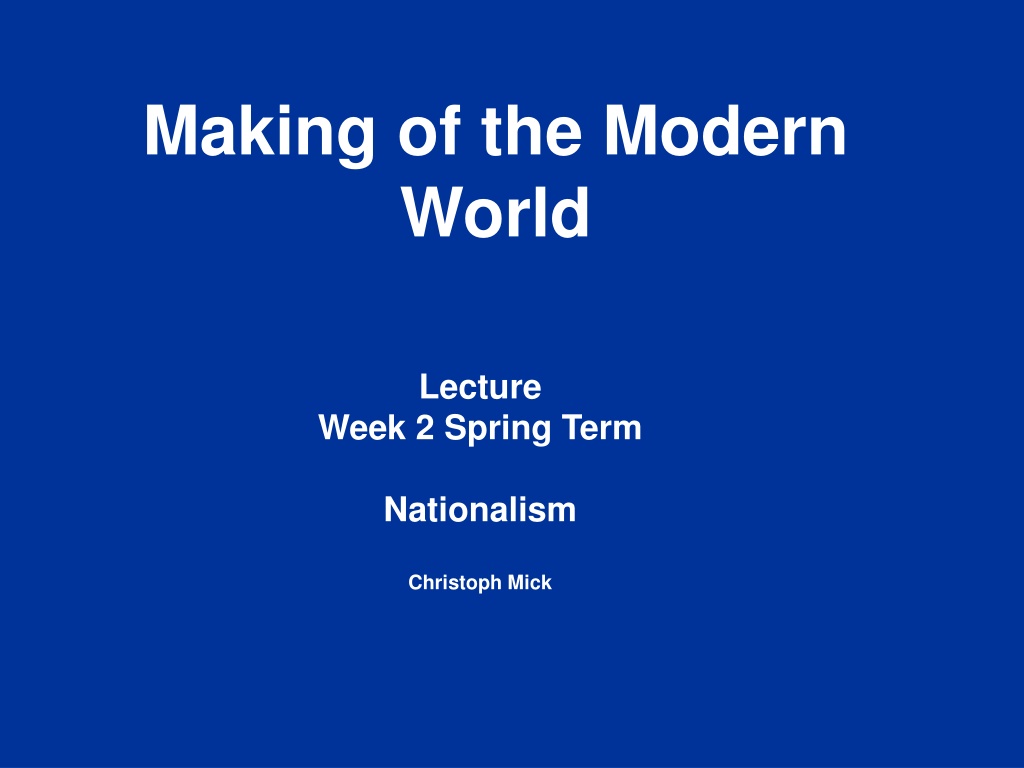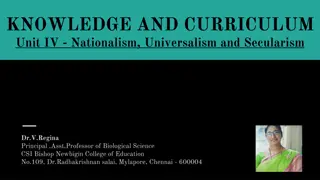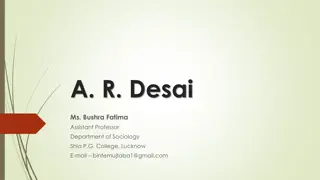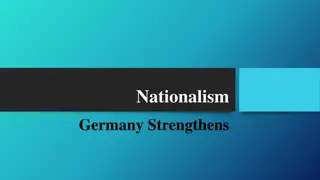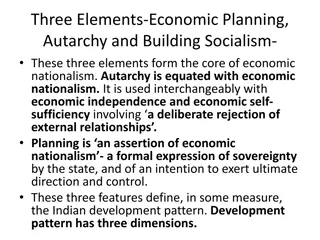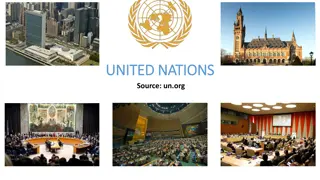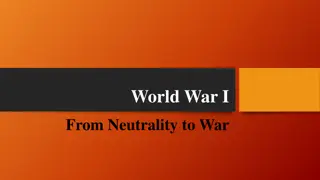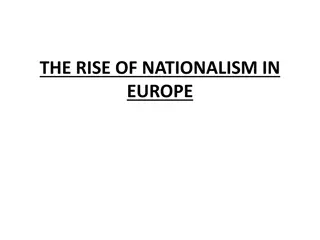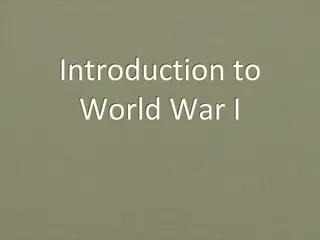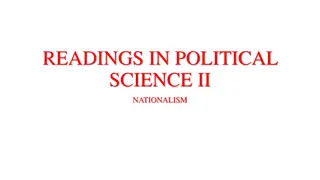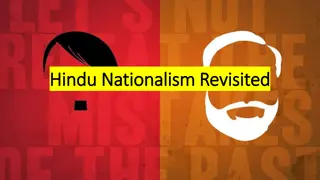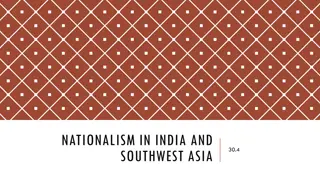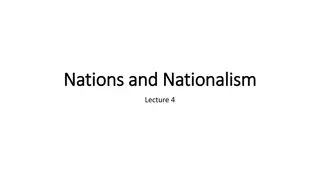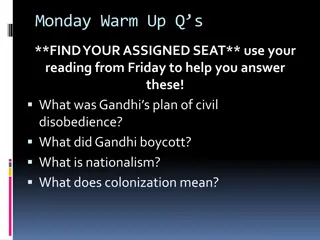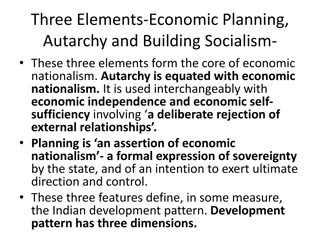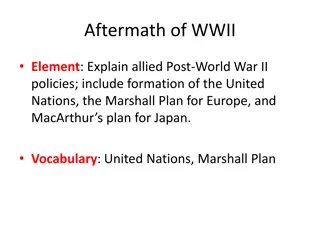Nationalism Through the Ages: Exploring the Evolution of Nations
Delve into the concept of nationalism with Christoph Mick in the "Making of the Modern World" lecture series. From defining nations to discussing the importance of national character and heritage, explore how nationalism has shaped societies throughout history.
Download Presentation

Please find below an Image/Link to download the presentation.
The content on the website is provided AS IS for your information and personal use only. It may not be sold, licensed, or shared on other websites without obtaining consent from the author. Download presentation by click this link. If you encounter any issues during the download, it is possible that the publisher has removed the file from their server.
E N D
Presentation Transcript
Making of the Modern World Lecture Week 2 Spring Term Nationalism Christoph Mick
Outline 1. Introduction 2. What is a nation? 4. Do nations need navels? 5. Nationalism and national indifference 6. Conclusion
Outline 1. Introduction 2. What is a nation? 4. Do nations need navels? 5. Nationalism and national indifference 6. Conclusion
Nature brings forth families; the most natural state therefore is also one people, with a national character of its own. For thousands of years this character preserves itself within the people and, if the native princes concern themselves with it, it can be cultivated in the most natural way: for a people is as much a plant of nature as is a family, except that it has more branches. Nothing therefore seems more contradictory to the true end of governments than the endless expansion of states, the wild confusion of races and nations under one scepter. An empire made up of a hundred peoples and a 120 provinces which have been forced together is a monstrosity, not a state-body. Johann Gottfried von Herder (1744- 1803) No greater injury can be inflicted on a nation than to be robbed of her national character, the peculiarity of her spirit and her language. Materials for the Philosophy of the History of Mankind (1784)
Man is a slave neither of his race nor his language, nor of his religion, nor of the course of rivers nor of the direction taken by mountain chains. Ernest Renan, 1823-1892, What is a nation? A nation is a soul, a spiritual principle. Two things, which in truth are but one, constitute this soul or spiritual principle. One lies in the past, one in the present. One is the possession in common of a rich legacy of memories; the other is present-day consent, the desire to live together, the will to perpetuate the value of the heritage that one has received in an undivided form
Outline 1. Introduction 2. What is a nation? 3. Do nations need navels? 4. Nationalism and national indifference 5. Conclusion
Primordialist view Key assumptions Nations are real process National sentiment is no construct It is rooted in a feeling of kinship Nations are eternal or at least go back to ancient times
Modernist view Nation as a natural, God-given way of classifying men, as an inherent political destiny, are a myth; nationalism, which sometimes takes preexisting cultures and turns them into nations, sometimes invents them, and often obliterates preexisting cultures: that is a reality . (Ernest Gellner)
Ernest Gellner Nations accompany the transition from agrarian societies to modern industrial societies Nations are functional for modern industrial society. The most important tool in forming nations is the modern education system The replacement of low by high cultures marks industrial society and nation building. Nationalism imposes the new high culture on the population and uses material from old low cultures as raw material see also The invention of tradition (Eric Hobsbawm) Nations are necessary, every single nation is contingent Ernest Gellner, Nation and Nationalism
Nations do not make states and nationalisms but the other way round . (Eric Hobsbawm)
Benedict Anderson Preconditions of nations Capitalism as a modern system of production and productive relations Print as a modern technology of communication Human linguistic diversity
Modernist view Key assumptions Nations are a product of modernity Nations are constructed by elites Nationalists created nations
Critics of the modernist position For the diffusion of national ideas could only occur in specific social settings. Nation-building was never a mere project of ambitious or narcissistic intellectuals Intellectuals can invent national communities only if certain objective preconditions for the formation of a nation already exist. Miroslav Hroch, From National Movement to the Fully-Formed Nation, p. 61
A nation can therefore be defined as a named human population sharing an historic territory, common myths and historical memories, a mass public culture, a common economy and common legal rights and duties for all members. Anthony D. Smith: National Identity. Reno, Las Vegas, London 1991, p. 14. http://nationalismproject.org http://nationalismproject.org
Intermediary position (Anthony D. Smith) Key assumptions Nations are a modern phenomenon, but have roots in pre- modern eras and cultures Modern nations are directly or indirectly related to older ethnies with their distinctive mythology, symbolism and culture Nations are expression of the need for collective immortality through posterity Nations are both construct and real process
Ethnicity (Fredrik Barth) Ethnicity is a social product Importance of interaction Ascribed and self-ascribed Categorical ascription Importance of the Other To the extent actors use ethnic identities to categorise themselves and others for the purposes of interaction, they form ethnic groups in this organisational sense. The critical focus of investigation from this point of view becomes the ethnic boundary that defines the group, not the cultural stuff it encloses. Fredrik Barth (ed.), Ethnic Groups and Boundaries (Boston, 1969), pp. 14-15
War and Nation There is a link between war and nation building To what extent are nations made in wars? In anti-colonial wars and uprisings globally In secessionist wars In wars of unification In World Wars
Outline 1. Introduction 2. What is a nation? 4. Do nations need navels? 5. Nationalism and national indifference 6. Conclusion
Nationalism Identical movement for attaining and maintaining the autonomy, unity and identity of an existing or potential nation . (Anthony D. Smith, The Origins of Nations, p. 108)
Nationalism A theory of political legitimacy which requires that ethnic boundaries should not cut across political ones, and in particular, that ethnic boundaries within a given state should not separate the power-holders from the rest. Ernest Gellner, Nation and Nationalism, p. 1
A nationalist argument is a political doctrine built upon three basic assertions: a. There exists a nation with an explicit and peculiar character. b. The interests and values of this nation take priority over all other interests and values. c. The nation must be as independent as possible. This usually requires at least the attainment of political sovereignty. John Breuilly, Nationalism and the State (Chicago, 1985), p. 3
Types of Nationalism (Michael Hechter) State-building nationalism: England, France Peripheral nationalism: Quebec, Scotland, Catalonia Irredentist nationalism: Sudeten Germans, Hungarians in Romania Unification nationalism: Germany, Italy Michael Hechter, Containing Nationalism (Oxford, New York, 2000), pp. 15-17
Problem with eurocentrism of typologies of nationalism What about anti-colonialism or anti- colonial nationalism? Many states (and nations) globally are a result of this struggle Nation states did not just simply spread from Europe to the rest of the world. South and Central American nation states are older than many European nation states
National indifference Not liked by nationalists Ideally everyone (who nationalists consider to be a member of the nation) should identify with the nation, should have a national consciousness National indifference was and is more common than nationalists like/liked and not just an expression of backwardness One example of national indifference are tutejszi/tutejshi in Eastern Poland in the inter-war period Hybrid, fluid and circumstantial identities Mixed heritage families National indifference or ambiguity can be a conscious choice but often wars and conflicts take this option away Tara Zahra, Imagined Communities: National Indifference as a Category of Analysis , Slavic Review, 69 (2010), pp. 93-119
Schedule 1. 2. 3. 4. 5. Introduction What is a nation? Nationalism German nation building Conclusion
Conclusion: some problems and questions Are nations really contingent (occur by chance)? Do nations need navels ? Why did the identification with the nation have a greater impact on behaviour than religious, regional, class or gender identifications? Is is this true and how important was (and is) national indifference ? National mass education is only possible after having a nation state, it does not explain the nationalism before and the emergence of national movements in backward agrarian societies. Importance of war and anti-colonial struggle for nation building
